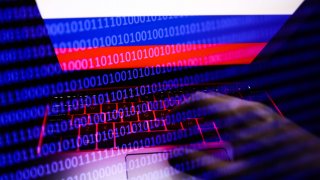
- As the Russia-Ukraine war rages on, cybersecurity attacks are becoming a very real threat around the world.
- Here are the best ways to protect yourself.
As the Russia-Ukraine war continues to escalate, cybersecurity attacks have become a very real threat around the world.
The number of cyberattacks being waged by both countries since the outbreak of the conflict is "staggering," according to the research arm of Check Point Software Technologies.
Get New England news, weather forecasts and entertainment stories to your inbox. Sign up for NECN newsletters.
"The problem is kinetic warfare is almost always accompanied by cyberwarfare," said Vahid Behzadan, an assistant professor of cybersecurity at the University of New Haven.
"This is something that private citizens may need to be concerned about."
More from Personal Finance:
These Social Security scams will try to steal your savings
More Americans are living paycheck to paycheck, report finds
Here's how urban and rural Americans build wealth
Money Report
"It's unlikely Russia would target the critical infrastructure here in the U.S.; however, there is a long history of Russian hackers engaging in patriotic attacks against entities not well aligned with the Russian government," Behzadan added.
In fact, grassroots volunteers around the world have already created widespread disruption in efforts to give either Ukraine or Russia an advantage.
As cybersecurity concerns increasingly spill over into daily life, here are the best ways to protect yourself:
Be on high alert
"The types of scams we can anticipate range from politically oriented robocalls and texts to fake donations and, in general, trying to get people involved in cryptocurrency," said Clayton LiaBraaten, a senior strategic advisor at spam-blocking app Truecaller.
Never open an e-mail attachment from someone you don't know and be wary of forwarded attachments from people you do know. It's always safer to enter the URL yourself than to click on a link or attachment.
Choose a strong password
Passwords should be 12 to 15 characters long with strategically placed special characters or symbols. You should have different passwords on each of your online accounts. To help keep track of them all, use a reputable password manager, like the ones provided by Apple, Google or Microsoft.
Keep your antivirus software up to date
Most types of antivirus software can be set up to update automatically. That will help prevent hackers from accessing your computer, laptop or smartphone, as well as alert you to websites and downloads that could be suspicious.
Use only trusted Wi-Fi resources
Free Wi-Fi seems convenient, but hackers can also use it to intercept your internet communications. Before joining a network at say, a coffee shop or retailer, confirm that the Wi-Fi connection you want to join belongs to a business you know and trust. When in doubt, use your personal Wi-Fi hotspot, or the network connection on your smartphone.
Be particularly wary of any request to provide information such as your date of birth, Social Security number or bank account. The same goes for the information you make available online through social media. Keep personal details private.
Check your credit
Look at your accounts regularly for any suspicious activity or unauthorized charges and set up notifications, through your bank or a banking app, which will track your credit card transactions and alert you to account activity.
If online access to your bank does become temporarily unavailable, it wouldn't hurt to have some cash on hand, Behzadan said.






